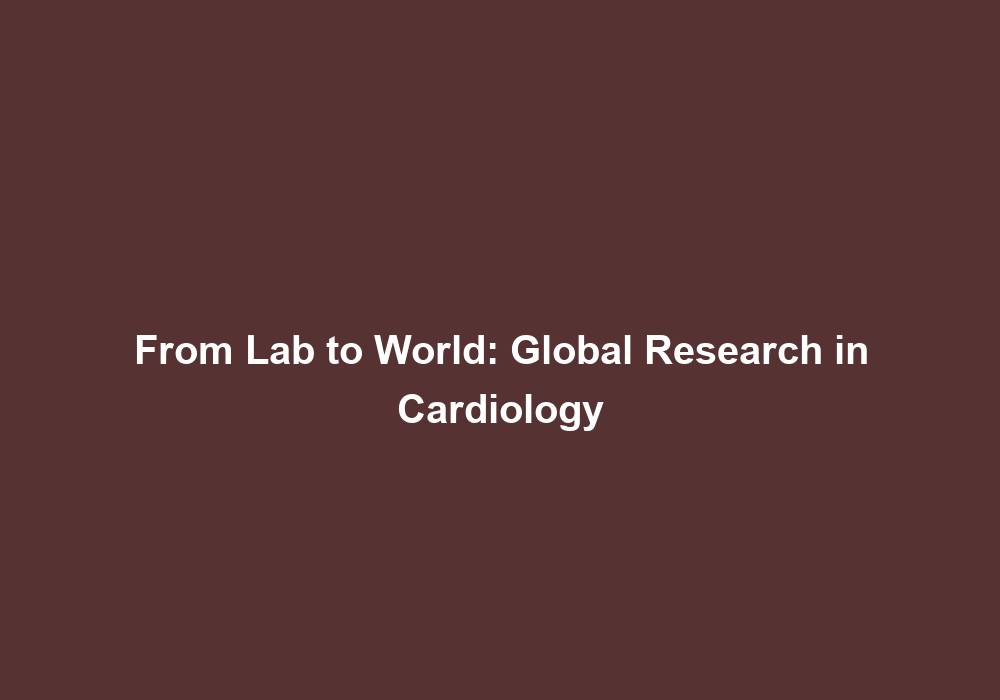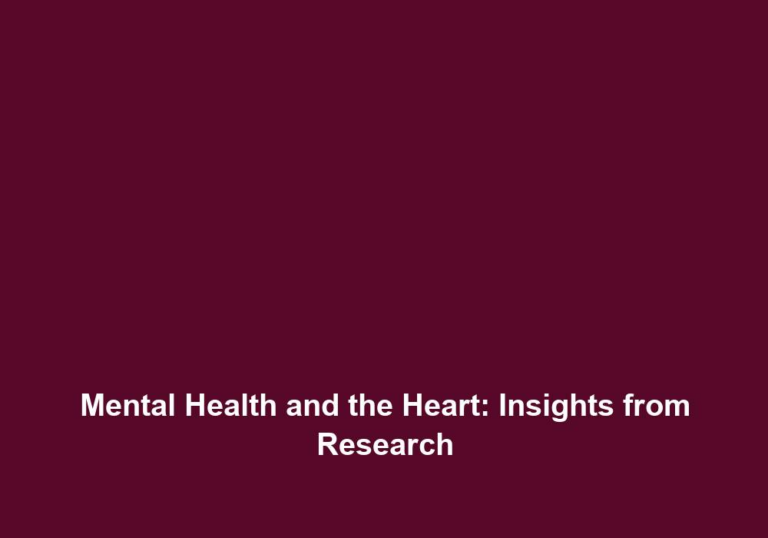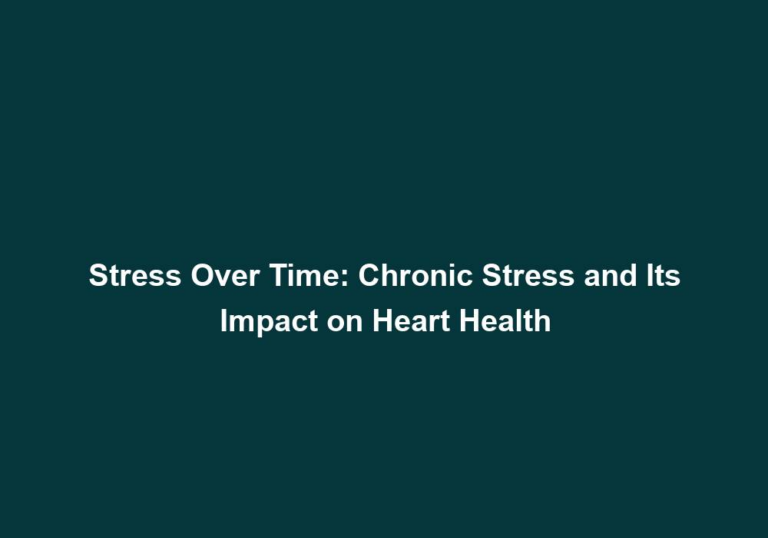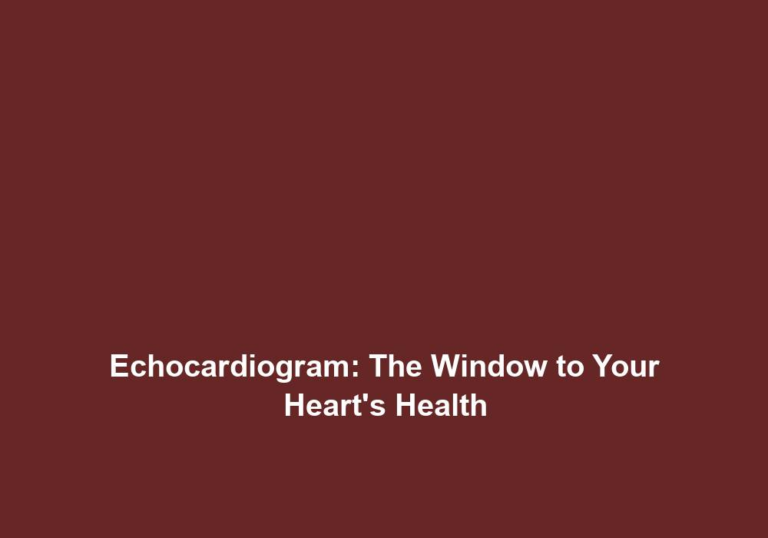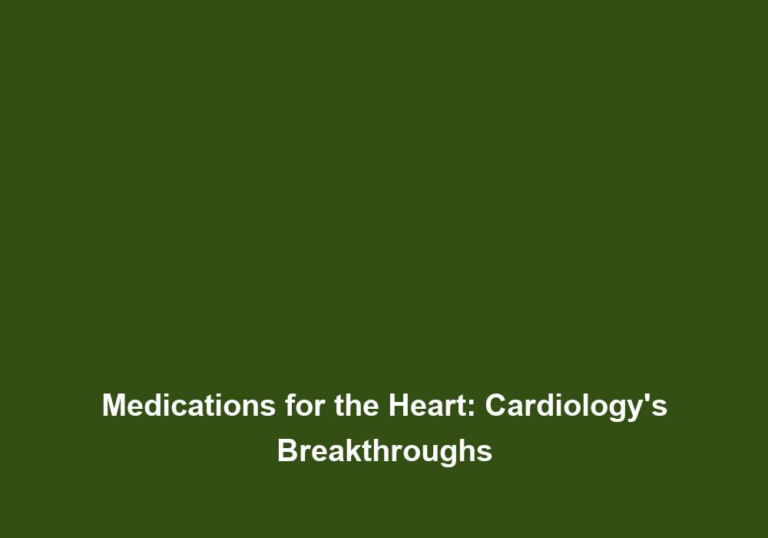From Lab to World: Global Research in Cardiology
Cardiology is an ever-evolving field of medical science that focuses on the study, diagnosis, and treatment of diseases and disorders of the heart and blood vessels. With the increasing prevalence of cardiovascular diseases worldwide, extensive research efforts are being made to discover innovative solutions and improve patient outcomes. In this article, we will delve into the exciting world of global research in cardiology, exploring the latest advancements, ongoing studies, and the impact they have on medical practice.
The Importance of Global Research in Cardiology
Global research in cardiology plays a pivotal role in advancing our understanding of cardiovascular diseases, enabling the development of effective therapies, and improving patient care. By collaborating across borders, researchers and medical professionals can share their insights, diverse perspectives, and expertise, leading to breakthrough discoveries and new treatment modalities.
Such collaboration allows researchers to gather and analyze data from diverse populations, contributing to a more comprehensive understanding of the causes, risk factors, and patterns of cardiovascular diseases worldwide. This knowledge helps tailor treatments to specific populations, ensuring that patients receive the most appropriate care based on their unique genetic, environmental, and lifestyle factors.
Moreover, global research in cardiology fosters the exchange of ideas and promotes scientific innovation through international conferences, collaborative studies, and research publications. This collective effort drives progress in the field, bringing us closer to novel therapeutic approaches and better patient outcomes.
Advancements in Cardiac Imaging and Diagnostics
One area of continuous advancement in cardiology is cardiac imaging and diagnostics. Cutting-edge technologies and techniques have revolutionized the field, allowing for more accurate and non-invasive assessment of cardiac function and structure. These advancements aid in the early detection, precise diagnosis, and monitoring of various cardiovascular conditions.
-
Magnetic Resonance Imaging (MRI): MRI has emerged as a powerful tool for assessing cardiac anatomy, function, and tissue characterization. Its ability to provide detailed three-dimensional images of the heart has significantly improved diagnostic accuracy and treatment planning. MRI can detect abnormalities in heart structure, evaluate blood flow, and assess myocardial viability, making it an indispensable tool for cardiologists.
-
Computed Tomography (CT) Angiography: CT angiography is a non-invasive imaging technique that allows for the assessment of the coronary arteries, identifying any blockages or stenosis. Its high spatial resolution and fast acquisition times make it an invaluable tool in diagnosing coronary artery disease. CT angiography enables clinicians to visualize the extent and severity of arterial blockages, aiding in treatment planning and decision-making.
-
Echocardiography: Echocardiography, also known as cardiac ultrasound, utilizes sound waves to create real-time images of the heart. It provides valuable information about cardiac function, valve abnormalities, and the presence of any structural defects. Echocardiography is widely used for diagnosing and monitoring various cardiac conditions, including heart failure, valvular diseases, and congenital heart defects. It is a non-invasive, cost-effective, and readily available imaging modality that plays a crucial role in patient management.
Furthermore, advancements in cardiac imaging have not only improved diagnosis but also enhanced the guidance and monitoring of interventional procedures such as angioplasty, stent placement, and transcatheter valve interventions. These imaging modalities enable precise guidance, reducing the risk of complications and optimizing patient outcomes.
Breakthroughs in Genetics and Personalized Medicine
Advancements in genetic research have paved the way for the era of personalized medicine in cardiology. By studying the genetic underpinnings of cardiovascular diseases, researchers can identify individuals at increased risk and develop targeted therapies based on their genetic profiles.
-
Genome-Wide Association Studies (GWAS): GWAS involves analyzing the genetic variations of thousands of individuals to identify genetic markers associated with specific diseases or traits. In the field of cardiology, GWAS has provided insights into the genetic basis of conditions such as hypertension, atherosclerosis, and cardiomyopathies. These studies have shed light on the underlying mechanisms of cardiovascular diseases and potential therapeutic targets.
-
Pharmacogenomics: Pharmacogenomics focuses on the study of how an individual’s genetic makeup influences their response to medications. With this knowledge, clinicians can tailor drug therapies to a patient’s unique genetic profile, maximizing efficacy and minimizing adverse effects. Pharmacogenomic testing helps identify patients who may require alternative medications or adjusted dosages, ensuring personalized treatment plans that optimize therapeutic outcomes.
Moreover, genetic testing plays a significant role in identifying hereditary cardiovascular conditions, such as familial hypercholesterolemia and inherited arrhythmias. Early identification of these conditions allows for proactive interventions and preventive strategies, ultimately reducing the burden of cardiovascular diseases on affected individuals and their families.
Emerging Trends in Cardiovascular Research
As technology and research methodologies continue to evolve, several emerging trends have the potential to shape the future of cardiology research and practice. These include:
-
Artificial Intelligence (AI): AI algorithms have shown promise in analyzing large-scale datasets, identifying patterns, and predicting outcomes in cardiovascular diseases. By harnessing the power of AI, researchers can extract valuable insights that may have otherwise gone unnoticed, leading to more personalized and precise interventions. AI can assist in risk stratification, disease classification, and treatment optimization, ultimately improving patient outcomes.
-
Precision Medicine: The concept of precision medicine revolves around tailoring treatments to individual patients, taking into account their unique genetic, environmental, and lifestyle factors. This approach holds great promise in improving patient outcomes and reducing the burden of cardiovascular diseases worldwide. Precision medicine integrates genetic information, biomarkers, and clinical data to guide treatment decisions, enabling targeted therapies with higher efficacy and fewer side effects.
-
Regenerative Medicine: Researchers are exploring the potential of regenerative medicine to repair and regenerate damaged heart tissue. Stem cell therapy and tissue engineering techniques offer hope for the development of alternative treatments for conditions such as heart failure and myocardial infarction. Regenerative medicine aims to restore cardiac function by promoting tissue regeneration, enhancing cardiac repair mechanisms, and improving overall heart health.
In conclusion, global research in cardiology is essential for the advancement of medical knowledge, the development of innovative therapies, and the improvement of patient care. With ongoing advancements in imaging technology, genetic research, and emerging trends, the future of cardiology research looks promising. By fostering collaboration and embracing new technologies, researchers and medical professionals worldwide can work together to tackle the global burden of cardiovascular diseases and improve the lives of millions.

